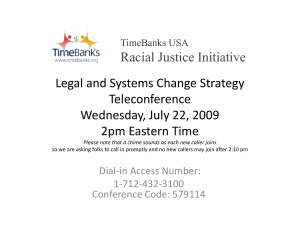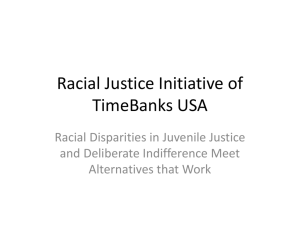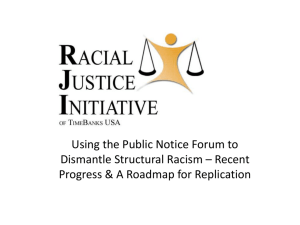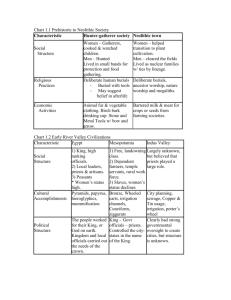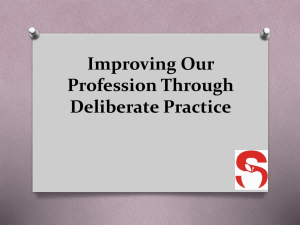John-Brittain-PP - Racial Justice Initiative of TimeBanks USA
advertisement
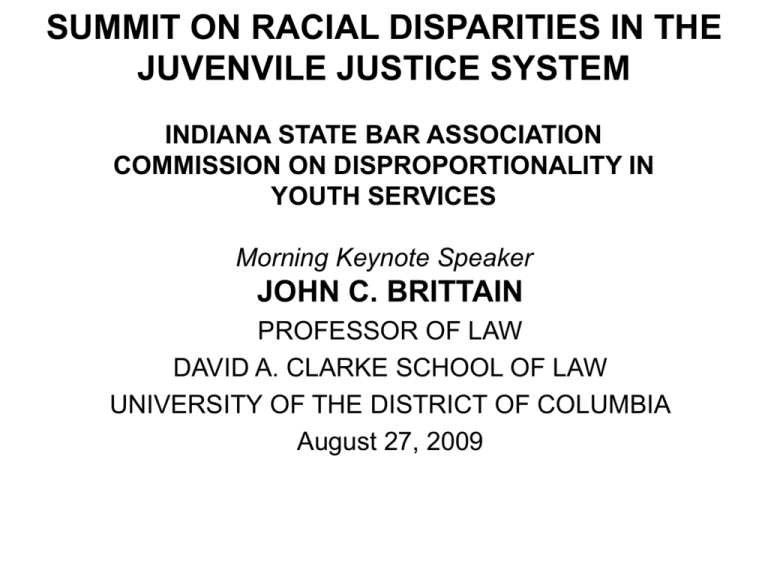
SUMMIT ON RACIAL DISPARITIES IN THE JUVENVILE JUSTICE SYSTEM INDIANA STATE BAR ASSOCIATION COMMISSION ON DISPROPORTIONALITY IN YOUTH SERVICES Morning Keynote Speaker JOHN C. BRITTAIN PROFESSOR OF LAW DAVID A. CLARKE SCHOOL OF LAW UNIVERSITY OF THE DISTRICT OF COLUMBIA August 27, 2009 TimeBanks USA Racial Justice Initiative Legal and Systems Change Strategy TimeBanks USA Background • Founded in 1980 by Edgar Cahn - a “Think and Do Tank” for reweaving community • Network to exchange ideas and build social capital • TBUSA Time Dollar Youth Court, a large-scale diversion program for arrested youth in Washington, DC - reduces juvenile recidivism • Hosted most recent conference, June 2009, “Dismantling Structural Racism in Juvenile Justice and Child Welfare.” Launched TUBSA’s Racial Justice Initiative Overview of TBUSA’s Racial Justice Initiative • In 2008 Edgar Cahn secured a planning grant from the WK Kellogg Foundation and began a major effort to address structural racism, and recruited Cynthia Robbins to co-lead the effort • TBUSA’s Racial Justice Initiative combines a targeted legal theory with Time Banking’s core principles to address disproportionality in juvenile justice, child welfare and special education • See also the law review article, An Offer They Can’t Refuse, a focus on juvenile justice Background of the Legal and Systems Change Strategy • June 30, 2009, University of the District of Columbia (UDC) Law Review released a pre-publication version of An Offer They Can’t Refuse: Racial Disparity in Juvenile Justice and Deliberate Indifference Meet Alternatives That Work, by Edgar Cahn and Cynthia Robbins • Intent Doctrine set forth in Washington v Davis (US 1976) created a significant burden for plaintiffs seeking relief from government discrimination because it requires them to prove that the government intended to discriminate. • Intent Doctrine hindered efforts to dismantle structural racism and address well documented Disproportionate Minority Contact and Confinement (DMC) within the Juvenile Delinquency System. • “An Offer” presents a new Legal and Systems Change Strategy Novel Legal Theory Overview • Basis of new theory is a unique application in the juvenile justice and Equal Protection context of the “Deliberate Indifference” standard from City of Canton v. Harris (1989) • Under City of Canton v Harris, a municipality can be liable under 42 USC § 1983 only where its policies cause the Constitutional violation – Only if a municipality’s practices evidence deliberate indifference to the rights of its inhabitants can such a shortcoming be properly thought of as a city policy or custom actionable under 42 USC § 1983 (in this case, it was a failure to train its employees) – Municipal liability under 42 USC § 1983 attaches if, and only if, city policymakers deliberately choose a practice or policy from among various alternatives Text of 42 USC § 1983 • Every person who, under color of any statute, ordinance, regulation, custom, or usage, of any State or Territory or the District of Columbia, subjects, or causes to be subjected, any citizen of the United States or other person within the jurisdiction thereof to the deprivation of any rights, privileges, or immunities secured by the Constitution and laws, shall be liable to the party injured in an action at law, suit in equity, or other proper proceeding for redress, …. For the purposes of this section, any Act of Congress applicable exclusively to the District of Columbia shall be considered to be a statute of the District of Columbia Proving Deliberate Indifference • A failure by policymakers to use knowledge about effective alternatives to incarceration that reduce DMC gives rise to liability under 42 USC § 1983 • To prove deliberate indifference for purposes of a claim under 42 USC § 1983, a plaintiff must demonstrate: – Injury to a right protected by the Constitution or federal law – That the injury was relatively certain to occur – That the government’s course of action was one selected from among various alternatives A Path to Proving Deliberate Indifference • Once officials receive formal notice of the racially-disparate injury caused by their present practice and notice of the availability of effective alternatives, the government’s continuation of the status quo constitutes “deliberate indifference” and proves intent for 42 USC § 1983 cases. • In the juvenile justice context, continuing to incarcerate youth of color at disproportionate rates instead of using more effective, less expensive alternatives constitutes “deliberate indifference” A Path to Proving Deliberate Indifference • To establish deliberate indifference in the juvenile justice context, “An Offer They Can’t Refuse” proposes a Public Hearing process to put officials on formal notice that: – Present system results in documented DMC that violates the Constitution; – Racial disparity remains even when accounting for all raceneutral factors; – Injuries flow from this disparity, specifically from the disproportionately high detention and incarceration rates for youth of color, but, in fact, at every point in the system youth of color are subjected to harsher treatment; – Highly effective, evidence-based, replicable, and less-costly alternatives would substantially reduce DMC. Achieving Systems Change • After receiving notice, if officials opt not to use more effective and less expensive alternatives to incarceration and continue the status quo of disproportionate incarceration, then they would be liable under 42 USC § 1983 • Officials who maintain the status quo will be politically vulnerable • Litigation is costly and time consuming; it is a last resort • We are hopeful that, officials facing the threat of provable liability will feel compelled to adopt alternatives • The Racial Justice Initiative strategy will give officials the “political cover” to establish community-based alternatives to incarceration for youth; the Initiative will insulate officials against “tough-on-crime” opponents Next Steps Comments • Please send an e-mail with any support statement or indicating a willingness to be called to develop a brief statement to comments@racialjusticeinitiative.org • We also invite comments on the law review article, “An Offer They Can’t Refuse” until August 31, 2009 via comments@racialjusticeinitiative.org Actions • Would you or your organization be interested in helping to organize a public hearing to address disproportionality? Do you know legislators, judges and/or administrators who might be willing to convene a hearing to put officials on notice?
